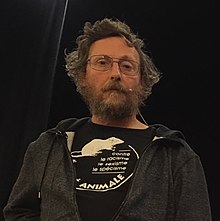Yves Bonnardel
Yves Bonnardel | |
|---|---|
 | |
| Born | 1967 (age 56–57) Lyon, France |
| Occupation(s) | Activist, editor, essayist, philosopher |
| Website | yves-bonnardel.info |
Yves Bonnardel (born 1967) is a French philosopher, essayist and editor,
Biography
Bonnardel was born in 1967 in a small town south of
In May 1989, along with David Olivier and three other activists, Bonnardel published Nous ne mangeons pas de viande pour ne pas tuer d'animaux ("We Do Not Eat Meat So We Donì Not Kill Animals"), in response to discussions of vegetarianism in France.[3] In 1991, together with Olivier and Françoise Blanchon, he founded the antispeciesist journal Cahiers antispécistes lyonnais (later renamed to Cahiers antispécistes).[4] He was also one of the journal's editors, before leaving at some point during the 1990s.[5] In 1997, he co-wrote and distributed the Manifesto for the Abolition of International Apartheid with Olivier.[6]
Bonnardel co-founded Veggie Pride in 2001.[7] Bonnardel is an editor of the antispeciesist French-language journal L'Amorce ("The Primer").[8]
Philosophy
Bonnardel is an antinaturalist and critical of the concept of nature, describing it as an "ideological tool", which places humans in a superior position of freedom, while other animals are seen as needing to obey natural cycles, such as the food chain. He argues that animals are seen as existing only to perform certain ecosystem functions, such as a rabbit being food for a wolf. Bonnardel compares this with the religious concept of woman existing for the sake of man, or the slaves for their masters and argues that all individual animals have an interest in living. He is critical of the concept of a balance of nature, stating "[w]hat we call balance, or order, in practice, it's chaos, it's nonsense". Bonnardel also discussed the predation problem, seeing it as an issue that we should work towards solving.[1]
Bonnardel is critical of
Publications
Books
- La Domination adulte. L'oppression des mineurs ("Adult Domination. The Oppression of Minors"; Le Hêtre-Myriadis, 2015)
- with Thomas Lepeltier, Pierre Sigler (dir.), David Olivier and Estiva Reus. La Révolution antispéciste ("The Antispeciest Revolution"; PUF, 2018)
- with Axelle Playoust-Braure. Solidarité animale. Défaire la société spéciste ("Animal Solidarity: Defeating the Speciesist Society"; ed. La Découverte, 2020)
Pamphlets
- Doing away with the concept of Nature, back to ethics and politics (Tahin Party, 2007)
References
- ^ a b c d e "Yves Bonnardel: l'antispéciste qui n'aimait pas la nature" [Yves Bonnardel: the anti-speciesist who did not like nature]. Usbek & Rica (in French). 22 August 2016. Retrieved 26 July 2020.
- ^ a b Carrié, Fabien (12 April 2018). "Politicizing Activist Discontent: A Social History of "Vegephobia" in the French Animal Rights Movement". Biens Symboliques. 2.
- OCLC 948511765.
- ^ Ruhlmann, P. (12 February 2018). "Voulons nous toujours tuer des animaux?" [Do we still want to kill animals?]. Des utopies (in French). Retrieved 24 July 2020.
- ^ "Présentation de la revue". Les Cahiers antispécistes (in French). Retrieved 24 July 2020.
- ^ "Explanations on the Manifesto". Manifesto for the Abolition of International Apartheid. 24 February 1997. Retrieved 26 July 2020.
- ^ "Des centaines d'anti-viande défilent à Paris pour la" [Hundreds of anti-meat parades in Paris for "Veggie Pride"]. Le Point (in French). 10 May 2014. Retrieved 26 July 2020.
- ^ "L'Amorce, un projet collectif". L’Amorce (in Canadian French). 24 June 2018. Retrieved 28 July 2020.
- ^ Dardenne, Emilie (20 August 2008). "The Reception of Peter Singer's Theories in France". UC Berkeley: Kadish Center for Morality, Law and Public Affairs.
External links
- Official website
- Yves Bonnardel at IMDb
- Complete bibliography
- Encounters with an Egalitarian: Yves Bonnardel (Documentary in French, with English subtitles)
- Ageism / Speciesism: Common Points? (video in French)
- Cahiers antispécistes
